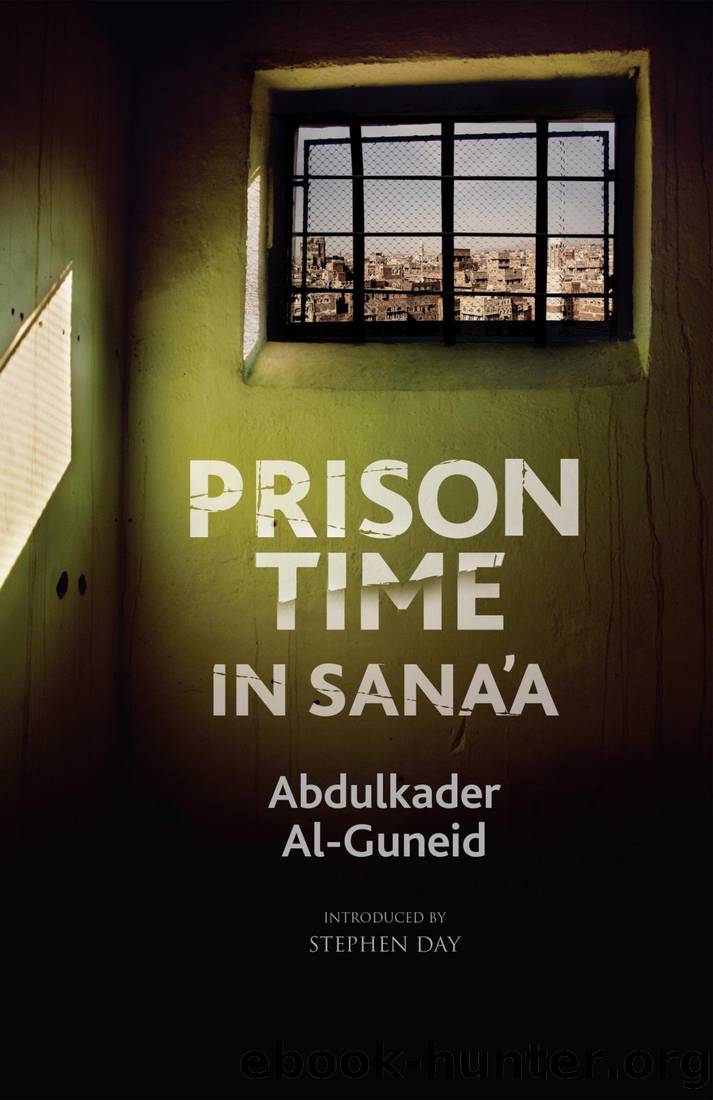Prison Time in Sana'A by Abdulkader Al-Guneid

Author:Abdulkader Al-Guneid [Al-Guneid, Abdulkader]
Language: eng
Format: epub
Tags: Military, Biography & Autobiography, Middle East, Arabian Peninsula, History, Political
ISBN: 9780992980870
Google: SU83zgEACAAJ
Goodreads: 56989385
Publisher: Arabian Publishing Ltd.
Published: 2021-07-15T12:52:44+00:00
Chapter 19
Mark not only started to eat but, when he saw me exercising, he joined in.
I could see he had been in good shape before his hunger strike and knew that he was conscious of the importance of a healthy diet and moderate portions, as did I. The only difference in our eating habits was that he ate quickly and liked to chat over meals, whereas I ate slowly and preferred not to talk. Even when we were only being given the standard prison food of bread and beans and maybe a little rice and meat, we were determined to keep up with our exercises. Despite this, we became thinner by the day and our beards grew long and ragged.
Mark was curious about our National Security jailers but couldnât quite grasp the difference between those working for Saleh and those working for the Houthis. The striking contrast between Abu Basheer and Abu Shamekh, however, made it easier to explain.
Abu Basheer, the commandant, was a pro-Saleh National Security professional who represented what was left of the old state. He remained reserved, but it was he who had arranged for our temporary special diet. I was to develop a respectful, if not cordial, relationship with him after I went to advise him about some severe medical problems he had as a result of a festering gunshot wound in his leg.
In fact, my medical care of the commandant continued even after I left the prison and was in Cairo awaiting a Canadian visa. Abu Basheer managed to track me down on WhatsApp and I helped arrange for him to be operated upon by a well-known Egyptian orthopaedic surgeon who was a specialist in infected bone fractures. It was a complete success and the commandant was profusely grateful for my help, but I declined to renew our acquaintanceship.
By contrast, Abu Shamekh, the top Houthi man, was a bombastic, rude, crude loud-mouth. Even so, I developed a working relationship with the man because he appreciated my willingness to act as the prisonâs unofficial doctor.
Mark despised Abu Shamekhâs shouting and always wanted to know what he had said. I did my best to diminish the insults with incomplete translations and did the same whenever Abu Shamekh asked me to translate what Mark had said.
My general aim was to keep the peace and avoid conflict but sometimes, when Abu Shamekh was particularly vindictive, I scolded him.
âLook, I donât translate everything you say to Mark, nor do I tell you what he thinks about you,â I said. âIf I translated what you both say to each other, he would go on another hunger strike.â
âThatâs exactly what a good mediator should do,â he replied with a smile after a short pause for thought.
I hadnât realised until then that mediation had been added to my medical duties. Over time, however, it was the latter that earned greater privileges, especially as I continued to offer advice to Abu Basheer about his leg wound. Months later I was in his private office to advise him on his medical treatment.
Download
This site does not store any files on its server. We only index and link to content provided by other sites. Please contact the content providers to delete copyright contents if any and email us, we'll remove relevant links or contents immediately.
| Bahrain | Egypt |
| Iran | Iraq |
| Israel & Palestine | Jordan |
| Kuwait | Lebanon |
| Oman | Qatar |
| Saudi Arabia | Syria |
| Turkey | United Arab Emirates |
| Yemen |
Empire of the Sikhs by Patwant Singh(23084)
The Wind in My Hair by Masih Alinejad(5095)
Rise and Kill First by Ronen Bergman(4788)
The Templars by Dan Jones(4689)
The Rape of Nanking by Iris Chang(4211)
12 Strong by Doug Stanton(3549)
Blood and Sand by Alex Von Tunzelmann(3203)
Babylon's Ark by Lawrence Anthony(2677)
The History of Jihad: From Muhammad to ISIS by Spencer Robert(2628)
No Room for Small Dreams by Shimon Peres(2368)
Inside the Middle East by Avi Melamed(2356)
The Turkish Psychedelic Explosion by Daniel Spicer(2356)
Gideon's Spies: The Secret History of the Mossad by Gordon Thomas(2350)
Arabs by Eugene Rogan(2299)
The First Muslim The Story of Muhammad by Lesley Hazleton(2271)
Come, Tell Me How You Live by Mallowan Agatha Christie(2260)
Bus on Jaffa Road by Mike Kelly(2159)
1453 by Roger Crowley(2030)
Kabul 1841-42: Battle Story by Edmund Yorke(2029)
